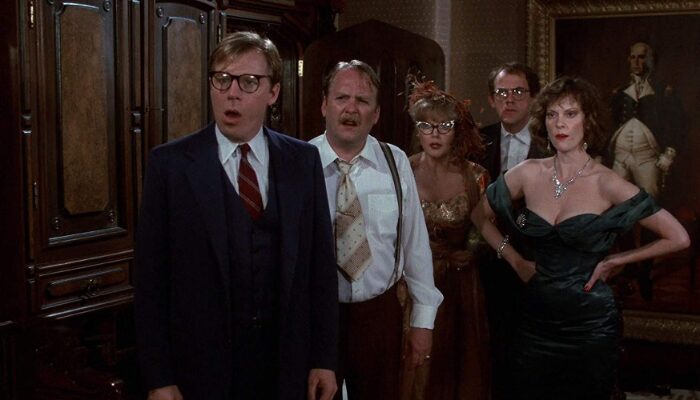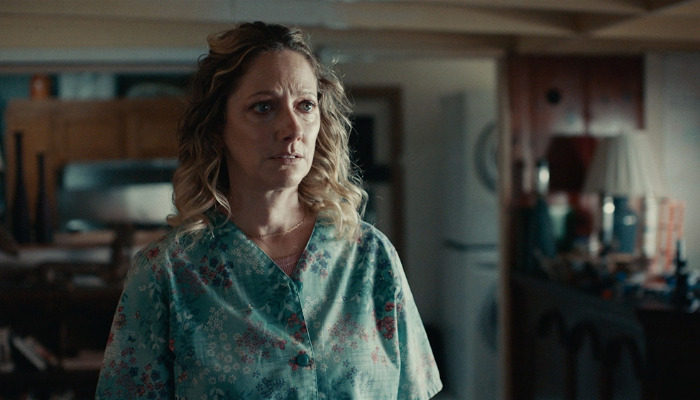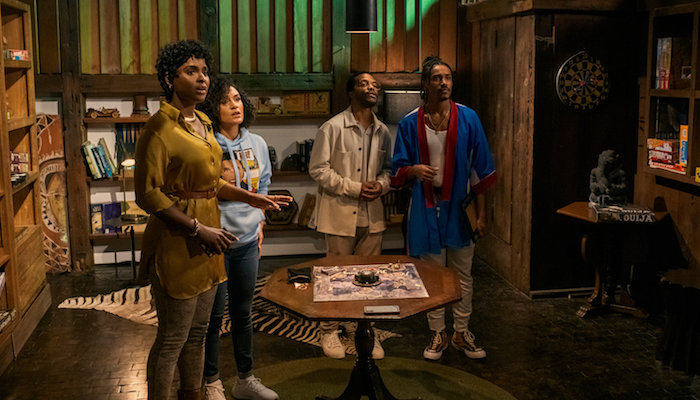Film Review: ERIC LARUE: Awkward Transition of Tragedy from Stage to Screen [Tribeca 2023]
Eric LaRue Review
Eric Larue (2023) Film Review from the 22nd Annual Tribeca Film Festival, a movie directed by Michael Shannon, written by Brett Neveu, and starring Alexander Skarsgård, Judy Greer, Alison Pill, Paul Sparks, Annie Parisse, Tracy Letts, Kate Arrington, Art Newkirk, Lawrence Grimm, Nation Henrickson, Jacob Alexander, Mierka Girten, Bobbie Peterson, and Logan Newkirk.
Brett Neveu brings his first adaptation of his own stage play, Eric Larue, to the screen by way of first time director Michael Shannon, and it loses some finesse in the transition.
Neveu is an ensemble member at A Red Orchid Theatre in Chicago, of which Shannon is one of its founders. Clearly Eric LaRue was, and is, a labor of love shared between Shannon and Neveu, driven by the timeliness of its subject, and eager to explore its depths. It’s easy to see the courage behind the conviction in this story of a school shooter’s impact on the families and their local community.
The set-up is remarkably effective, establishing the mood right away. The dark pall of tragedy hovers over every action and reaction as a brooding woman, Janice Larue (Judy Greer), goes soberly about her business, rebuffing — and rather rudely at that — anyone attempting support or solicitude. Soon enough the absence of her son Eric heralds festering grief, big time. By degrees we discover Eric was a high school student who had shot and killed three classmates in a bid for vengeance.
It makes sense that community outreach lay in the hands of the clergy; after all, it goes with the territory. But why Neveu penned the pastors of two rival congregations as he did, and in such low regard, is a bit mystifying. For example, we’re not sure what to make of well meaning minister, Jack (Lawrence Grimm) when he bolts home after losing control of a ‘healing’ group session with Janice in attendance. Is the humor peppered in meant as comic relief? On the other hand, Daddy Larue’s paternal pastor, despite his rank chauvinistic ideology, is warm, caring, and convincingly charismatic at the pulpit.
In fact, stage bound as all the characters are, the performances are striking, all around — major kudos to Shannon’s directing skills; when it comes to acting, here he gets as good as he gives. Ms. Greer’s sadness is spot on; Alexander Skarsgård is the strapping but gentle hubby in true evangelical tradition; Alison Pill is remarkable in her turn as the chipper blonde in Larue’s congregation, who can’t seem to keep her hands off him; Annie Parisse, Kate Arrington, and Mierka Girten are all extraordinary as the grieving moms.
The heavy handed, declamatory dialog in Eric Larue, no doubt to good effect on stage, consists of long stretches of cold shouldered silence, alternating with abrupt, sniping confrontations, put downs, and rude interruptions, emphasizing the characters’ inability to make meaningful progress through the miasma of grief and resentment. But it lacks the sharp cadence and poignancy we find in stage-to-film works by David Rabe or Mamet. As a result, the audience doesn’t fare much better. We can only watch as cinematic subtleties come up short.
We finally get to meet Eric in prison when Janice, apparently after much trepidation, goes to visit him for the first time, in a visiting area which, on a visiting day, is inexplicably empty. The interaction between him and Janice is much the same in tone as the embittered or shrieking ones with Larue, her boss, or her neighbor — blunted and whispered.
Then there is Eric, hunched over and monotone, who astutely catalogs the bad prison conditions, rotten food, poor treatment by the guards, states time and again his taking responsibility, despite the fact that — yes, okay, so he was bullied, but so what — still undeserving of any scrap of consideration or forgiveness. After offering his mother some veiled insults, he extracts a promise to convey his remorse to the mothers of his victims. (The custom is to write letters to that effect — ask any corrections counselor.) She takes without comment his demand that she never come back, and leaves without a word.
The last scene is the most perplexing of all. Janice abandons her car at the side of a road devoid of traffic — more emptiness — continuing on foot as the credits roll, leaving us to ponder its meaning.
In the long run, while Eric Larue easily holds our attention, and the pacing is good, it doesn’t shine any new light on the nature of kids who kill kids, unless . . . Is surrendering to futility the only answer to suffering?
Rating: 6/10
Leave your thoughts on this Eric Larue review and the film below in the comments section. Readers seeking to support this type of content can visit our Patreon Page and become one of FilmBook’s patrons. Readers seeking more Tribeca Film Festival news can visit our Tribeca Film Festival Page, our Film Festival Page, and our Film Festival Facebook Page.
Readers seeking more film reviews can visit our Movie Review Page, our Movie Review Twitter Page, and our Movie Review Facebook Page.
Want up-to-the-minute notifications? FilmBook staff members publish articles by Email, Feedly, Twitter, Facebook, Instagram, Tumblr, Pinterest, Reddit, Telegram, Mastodon, and Flipboard.
Related Articles
FilmBook's Newsletter
Subscribe to FilmBook’s Daily Newsletter for the latest news!













